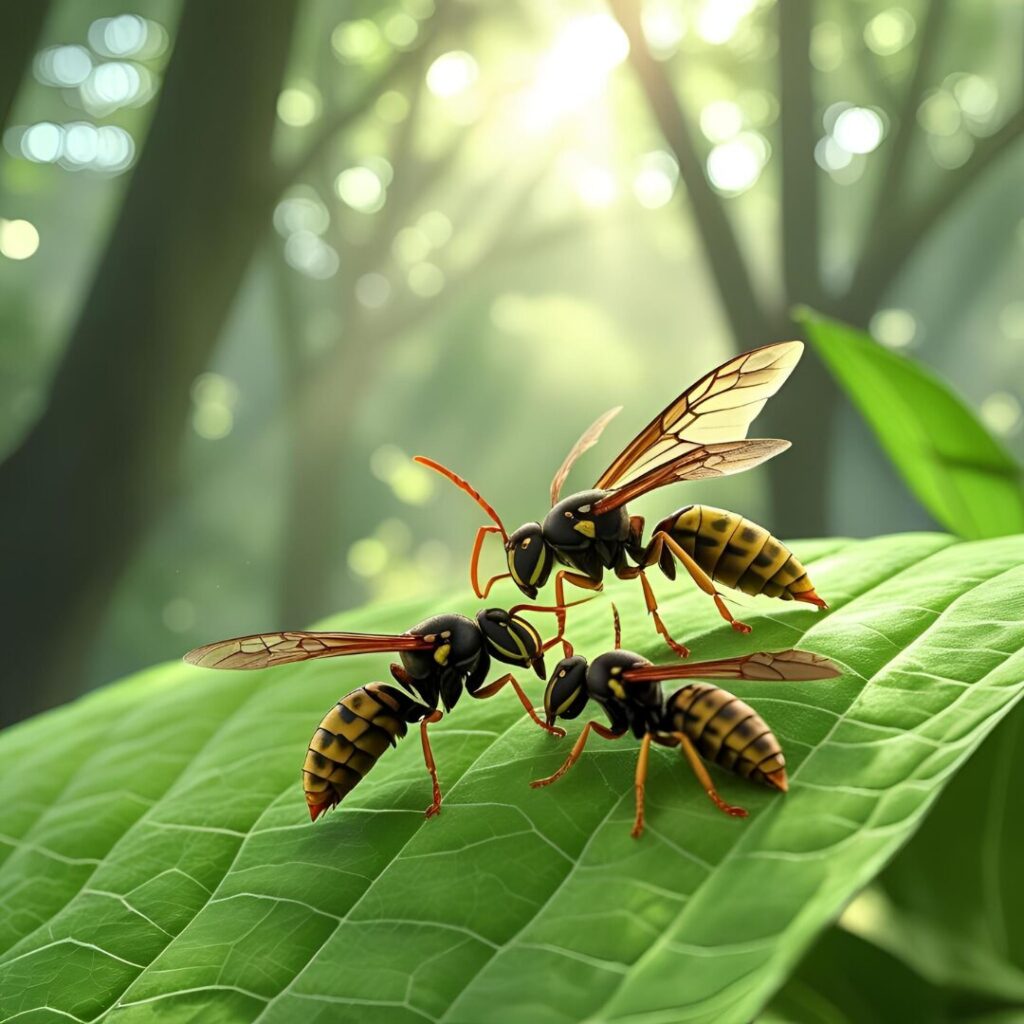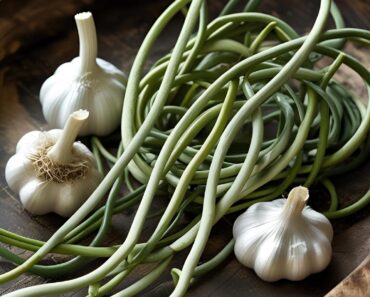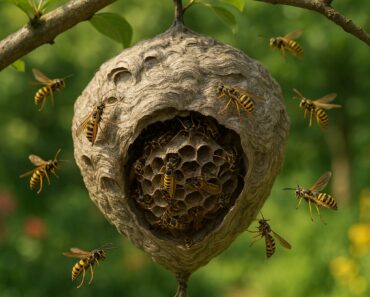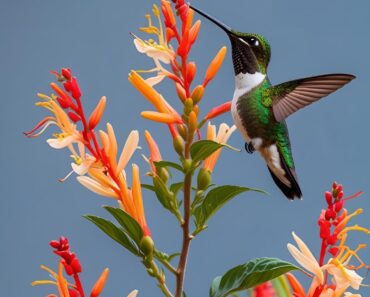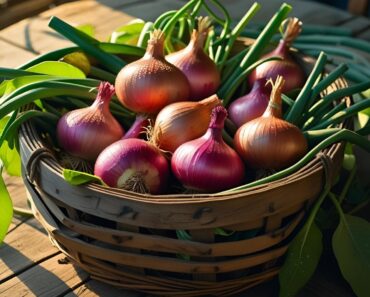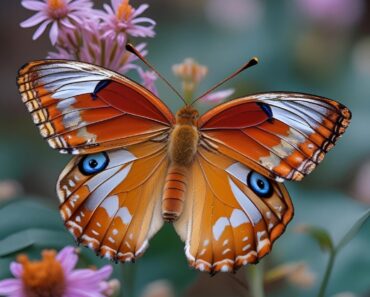Braconid wasps (family Braconidae) are small, slender insects, typically less than 1.5 cm long, that play a pivotal role in maintaining ecological balance by parasitizing a wide range of insect pests26. Unlike social wasps, braconids are solitary and use their long ovipositors to lay eggs inside or on the bodies of host insects, especially the larval stages of moths, butterflies, beetles, flies, aphids, and more6814.
-
: Female braconid wasps locate suitable hosts—often pest larvae—and inject eggs into or onto them.
-
: The wasp larvae feed on the host’s tissues, usually undetected by the host’s immune system, eventually killing or sterilizing it26.
-
: Larvae pupate within or near the host, often spinning silk cocoons visible on plant surfaces14.
-
: New adults emerge, ready to repeat the cycle, seeking out fresh pest hosts.
This lifecycle ensures that braconid wasps directly suppress pest populations, often before the pests can cause significant damage214.
1.
Braconid wasps specialize in parasitizing pest insects, including many of the most destructive garden and crop pests such as:
-
Caterpillars (cabbage worms, tomato hornworms, armyworms, loopers)
-
Aphids
-
Beetle larvae (including wood-boring and grain pests)
-
Leaf miners
Their specificity means they rarely harm beneficial insects, pollinators, or non-target species, making them a safe choice for integrated pest management16.
2.
By relying on braconid wasps, growers can significantly reduce or even eliminate the need for synthetic pesticides. This brings several advantages:
-
: No chemical residues, supporting organic and sustainable practices13.
-
: Reduced exposure to toxic substances13.
-
: Unlike chemicals, pests are less likely to develop resistance to natural enemies like braconids13.
3.
-
: Once established, braconid wasps can provide ongoing pest control with minimal recurring costs compared to repeated chemical applications13.
-
: Braconids reproduce and disperse naturally, offering long-term pest management.
-
: They help prevent pesticide runoff and protect water quality and non-target wildlife13.
4.
Braconid wasps help maintain a balanced ecosystem by:
-
: By controlling pests, they allow other beneficial insects and plants to thrive212.
-
: By targeting root-feeding pests, braconids indirectly contribute to healthier soils2.
Numerous studies and field applications have demonstrated the effectiveness of braconid wasps:
-
: Laboratory and field trials show braconid wasps like Bracon brevicornis and B. hebetor achieve more than 80% pest control efficacy across a range of temperatures and host densities19.
-
: Braconid wasps have been used to control pests in stored products, field crops, greenhouses, and even in protecting wooden structures from beetle infestations, with success rates of up to 100% in some cases1015.
-
: Species such as Apanteles glomeratus (cabbage butterfly larvae), Aphidius colemani (aphids), and Spathius exarator (wood-boring beetles) are commercially available and widely used in biological control programs worldwide6810111215.
Braconid wasps exhibit two main strategies:
-
: Laying eggs inside the host, where larvae develop undetected until they consume the host from within68.
-
: Paralyzing the host and laying eggs on its surface, with larvae feeding externally68.
Both strategies result in the eventual death or sterilization of the pest, halting its ability to reproduce or damage crops. In some species, a single host can support dozens or even hundreds of wasp larvae, amplifying their impact6.
To maximize the benefits of braconid wasps, gardeners and farmers can take several steps:
1.
Adult braconids feed on nectar and pollen. To attract and sustain them, plant:
-
Sweet alyssum
-
Yarrow
-
Buckwheat
-
Dill, fennel, and other umbellifers
These flowers provide the energy adults need to hunt for hosts and reproduce.
2.
Broad-spectrum insecticides can kill braconid wasps and other beneficial insects. Use targeted, least-toxic options only when absolutely necessary, and avoid spraying during periods of high wasp activity21316.
3.
Maintain a mix of flowering plants, shrubs, and undisturbed areas to offer shelter and alternative food sources for braconids and other beneficials111216.
4.
In commercial or high-value crops, braconid wasps can be purchased and released to bolster natural populations, especially in greenhouses or where pest pressure is high71113.
-
: Braconid wasps do not sting or bite people and are harmless to pets and livestock2514.
-
: Their targeted nature means they will not disrupt beneficial insect populations or pollinators16.
-
: Factors like habitat loss, pesticide use, and climate change can threaten braconid populations, so fostering a supportive environment is key2.
-
: Bracon hebetor is used to control moth larvae in stored grains, reducing infestations without chemical residues79.
-
: Spathius exarator has been successfully deployed in historic buildings to control furniture beetles, achieving up to 80–100% reduction in pest emergence1015.
-
: Aphidius colemani and Apanteles glomeratus are routinely released in greenhouses and vegetable fields to manage aphids and caterpillars, supporting organic production and reducing pesticide reliance6111213.
| Factor | Chemical Control | Braconid Wasps (Biocontrol) |
|---|---|---|
| Input Costs | High (repeated sprays) | Moderate (initial release) |
| Recurring Expenses | High | Low (self-sustaining) |
| Resistance Management | Costly, often fails | Naturally sustainable |
| Environmental Impact | High | Low to none |
| Consumer Preference | Risk of residues | High for organic/residue-free |
| Labor and Safety | High risk, PPE needed | Minimal risk, safe to handle |
Early adoption of braconid wasps can prevent pest outbreaks, reduce emergency control costs, and improve marketability by enabling organic or residue-free produce13.
Braconid wasps are indispensable allies for anyone seeking to manage pests sustainably. Their precision targeting, effectiveness against a wide range of harmful insects, and compatibility with organic and integrated pest management systems make them one of the most valuable biological control agents available2681113.
By fostering braconid wasps in your garden or farm, you not only protect your crops but also contribute to a healthier, more balanced ecosystem—reducing chemical use, supporting biodiversity, and ensuring long-term productivity. Embrace these tiny wasps, and let nature’s pest control experts do the work for you.
- https://pubmed.ncbi.nlm.nih.gov/34123600/
- https://bugbrief.com/braconid-wasps/
- https://australian.museum/learn/animals/insects/braconid-wasps/
- https://agrio.app/How-to-maximize-the-value-of-parasitic-wasps-in-agriculture/
- https://www.farmbrite.com/post/using-parasitoid-wasps-on-you-farm
- https://www.britannica.com/animal/braconid
- https://peerj.com/articles/11540/reviews/
- https://en.wikipedia.org/wiki/Braconidae
- https://peerj.com/articles/11540.pdf
- https://www.icup.org.uk/media/izvfoktx/icup1232.pdf
- https://www.motherearthnews.com/organic-gardening/beneficial-insects-braconid-wasps-zw0z1301zkin/
- https://pacifichorticulture.org/articles/braconid-wasps/
- https://www.koppert.com/knowledge/benefits-of-using-parasitic-wasps-for-pest-control/
- https://www.ndsu.edu/agriculture/ag-hub/ag-topics/crop-production/diseases-insects-and-weeds/insects/braconid-wasp-cocoons-common
- https://www.icup.org.uk/media/w21lc41z/icup1133.pdf
- https://www.grotongardenclub.org/post/beneficial-bugs-parasitic-wasps
- https://blogs.ifas.ufl.edu/stjohnsco/2021/09/19/ipm-biological-control-the-braconid-wasp-cotesia-congreta/
- https://agsci.colostate.edu/agbio/ipm-pests/parasitoid-wasps/
- https://www.sciencedirect.com/science/article/pii/S2095311918620787
- https://ontosight.ai/glossary/term/braconidae-wasps-in-biological-control–67a29eb8c445bf945af37a18
- https://cdn.dal.ca/content/dam/dalhousie/pdf/faculty/agriculture/oacc/en/2021/FINAL-%20Biocontrol-%20Janet%20Wallace.pdf
- https://www.mdpi.com/2071-1050/16/22/10004

